With the current glut of news and new releases, it's a perfect time to start shopping for the best graphics card. Not only has AMD released their long awaited Radeon VII, but Nvidia launched a less expensive, ray tracing equipped card in the RTX 2060. Additionally, a forthcoming GTX offering that utilizes Turing architecture but with the ray tracing and DLSS support stripped out is imminent, meaning there will be a broader range of current, properly supported Nvidia cards available than at any point in living memory. There are some extremely niche audiences being catered to in the video card market now, and you can find a GPU for practically any price you can imagine. If all this technical jargon is making your head spin, have a look at our comprehensive hardware glossary for a breakdown of a ton of common terms and lingo.
So with all this staggering diversity, what should you be considering when you start looking around for the best graphics card? The first and most important factor is what kind of output you're chasing. If you don't have 4K display, then buying something like a 2080 Ti or even a Radeon VII is probably overkill (though those cards will certainly easily handle the vast majority of games at 1440p Ultra if that's your bailiwick). That said, if you agree with Nvidia that ray tracing represents the glorious future of gaming, with its incredible lighting, shadows, and reflections, you need to invest in something from their 20-series - 2060 will be enough horsepower for 1080, but for higher resolutions you'd be best settling on a 2070 or 2080/Ti. On the opposite end of the spectrum, if you're just looking to run modest games, stuff like the latest battle royales, and are looking to save some scrip, you'd be well served by the still relatively powerful 1070 Ti or even an entry level card l ike the 1050.
Of course, some people aren't interested in the headaches of building or upgrading a machine themselves, in which case we've got a great, handy guide to the best gaming PC you can get prebuilt and ready to plug and play. Or if you need some new peripherals to accompany our GPU, check out our best gaming keyboard and best gaming mouse roundups.
Best gaming keyboard | Best gaming mouse | Best controller for PC gamingBest gaming chair | Best gaming PC | Best CPU for PC gaming
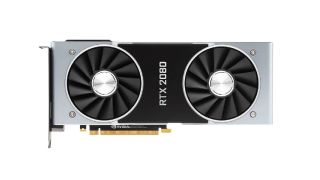
Nvidia GeForce GTX 2080 Founders Edition
1. Nvidia GeForce GTX 2080 Founders EditionThe best graphics card for performance at a (semi-)reasonable price
GPU Cores: 2,944 | Base Clock: 1,515MHz | Boost Clock: 1,800MHz | GFLOPS: 10,958 | Memory: 8GB GDDR6 | Memory Clock: 14Gbps | Memory Bandwidth: 448GB/s
Incredible performance
Crushes 4K with ease
Very limited application of ray-tracing
Expensive
The best card on the market now in terms of performance and price. While the 2080 is still an expensive proposition, the crypto-mining craze has abated somewhat and it's finally possible to find the Founders Edition at the listed MSRP, $799 (or cheaper). While the step-up version, the 2080 Ti, is more powerful, the additional $400 isn't worth it for a relatively marginal increase in computing power (between 10 and 30 percent), especially considering the relatively limited use cases for ray tracing that exist at the moment.
While Battlefield V looks great with ray tracing enabled (and will reportedly perform 50% better after the recently announced patch), it's one of an extremely limited field of games currently taking advantage of the technology. As more games that exploit ray tracing make their way into the wild and the Ti's price declines it may look like the stronger value proposition, but right now the 2080 is king of cards.
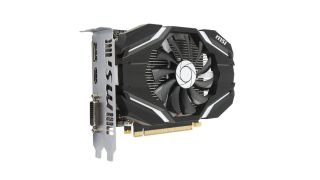
Entry level card at bargain basement prices
GPU Cores: 640 | Base Clock: 1,354MHz | Boost Clock: 1,455MHz | GFLOPS: 1,862 | Memory: 2GB GDDR5 | Memory Clock: 7.011 GT/s | Memory Bandwidth: 112GB/s
Incredibly affordable
Solid efficiency
Slight memory
Struggles at medium high settings with current games
Gaming PCs aren't cheap, and if you're an impoverished college student or just generally trying to dip your toes into the wonderful world of PC gaming but are trying to hew closer to console prices, Nvidia's bargain basement priced 1050 is your best bet. At slightly over $100, the 1050 is a fantastic entry level card that will let you play almost all modern games at modest settings.
It's also a great choice for a second PC or to tide you over until you can afford to upgrade to a new 20-series card (or perhaps AMD's shiny new Radeon VII). While the 1050 won't win any prizes for performance, the price tag makes it an attractive choice for bargain hunters.
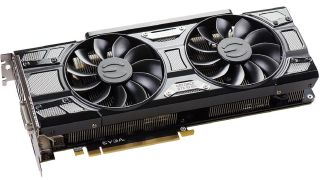
Nvidia GeForce GTX 1070 Ti
3. Nvidia GeForce GTX 1070 TiAn excellent balance of performance and price
GPU Cores: 2,432 | Base Clock: 1,607MHz | Boost Clock: 1,683MHz | GFLOPS: 8,873 | Memory: 8GB GDDR5 | Memory Clock: 8Gbps | Memory Bandwidth: 256GB/s
Competitively priced high performance
Fills a mid-range gap in Nvidia's product line
Supply issues
The 1070 Ti, another iteration on the now prolific Pascal, is one of the best mid-range cards on the market. If you're looking for a card to power games at 1440p resolution and that can easily handle VR, and aren't looking for the blistering performance of cards hundreds of dollars more expensive, the 1070 Ti admirably balances performance and cost.
Approaching the performance levels of the base 1080 for significantly less cost, the 1070 Ti is a granular answer to the challenge of AMD's Vega line. If you want killer performance but aren't ready to upgrade to something in the 20-series family, the 1070 Ti is a great upgrade option that will save you a few bucks, at least until Nvidia starts to properly phase them out.
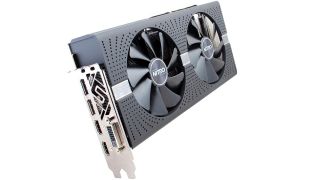
GPU Cores: 2,304 | Base Clock: 1,257MHz | Boost Clock: 1,340MHz | GFLOPS: 6,175 | Memory: 8GB GDDR5 | Memory Clock: 8 GT/s | Memory Bandwidth: 256GB/s
Excellent price and availability
Great match for current games
Starting to show its age
If you have yet to make the leap to a 4K display, spending a tremendous amount of money on an overpowered GPU may seem like an act of excessive decadence. While you're saving cash for a new 4K monitor/panel, the $200 the 580 shaves off the price of the next tier of cards is very significant, and AMD's budget option can easily cope with the tail of the 1080p era.
For the budget conscious and anyone looking to ensure your PC is keeping pace with current generation consoles, the 580 is a great solution. And its 8GBs of GDDR5 is generous in comparison to Nvidia's similarly priced 1060 line, overhead that will be greatly appreciated as rendering demands continue to escalate.
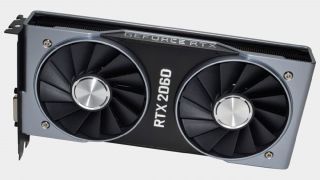
Nvidia's latest card delivers the lowest price for ray tracing
GPU Cores: 1,920 | Base Clock: 1,365MHz | Boost Clock: 1,680MHz | GFLOPS: 12,902 | Memory: 6GB GDDR6 | Memory Clock: 14 GT/s | Memory Bandwidth: 336GB/s
A less expensive replacement for the 1070 Ti
Lowest price point for ray tracing and DLSS
Still pricey for an 'entry level' card
Nvidia's latest release in its RTX line, the 2060, is the cheapest way to prepare your rig for our ray tracing, DLSS enabled future. As well as packing Nvidia's much touted new features, the 2060 outperforms the card it's meant to replace, the 1070. It gets you everything packed into the 2070's stable, just slightly less of each, but if you're looking to grab a card to handle 1080p and 1440p gaming the 2060 is the least expensive way to get onboard the ray tracing bandwagon.
If you've already got something in the 1070 range, the jump to the 2060 might seem premature, especially around launch when they'll be hovering near full price. But if you're looking to step up from a 970 or lower card, the 2060 is your best bet for great performance that will, to some extent, future proof your setup for the inevitable proliferation of DXR.
Some online stores give us a small cut if you buy something through one of our links. Read our affiliate policy for more info.






0 comentários:
Postar um comentário